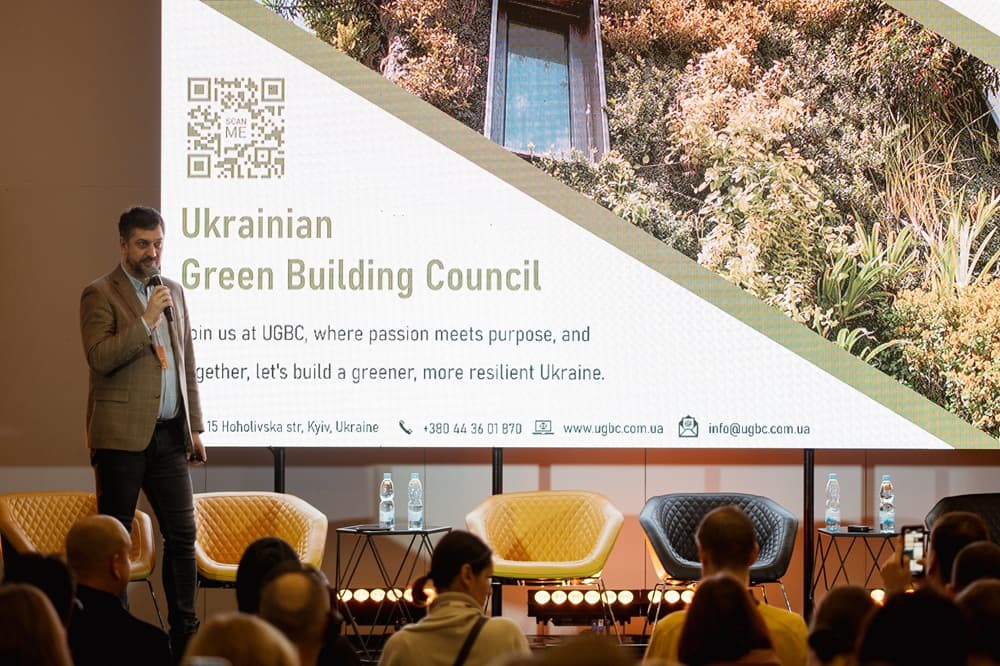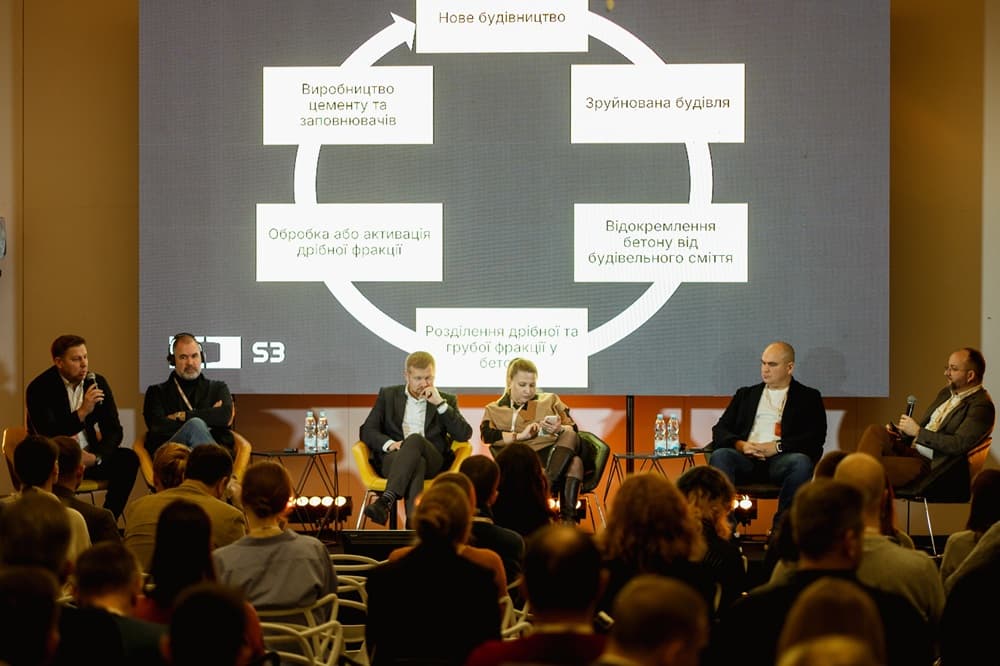On November 21, 2024, ESG experts of BDO in Ukraine Viktoriia Sukhanenko and Mariia Tretiak participated in the “Green and Circular Reconstruction of Ukraine” Summit, an event organized by the Pro ReThink platform.
The event served as a forum for professionals to engage in constructive dialogue on the challenges and strategies for implementing a green reconstruction approach in Ukraine. Key topics included the introduction of a green certification system, the reuse of war waste, and the integration of sustainable development principles.
Systemic approaches to green and circular economies are of strategic importance for Ukraine. They will not only help reduce the environmental impact of restoration projects, but will also become a tool for fulfilling international obligations, in particular on the way to joining the European Union. Furthermore, integrating such principles will help improve the quality of life of Ukrainians in the postwar period.
Andrii Teliupa, Deputy Minister of Economy of Ukraine, highlighted the country’s distinctive opportunity to become a frontrunner in Europe in the field of recovery and reuse of construction products. He underscored the significance of leveraging the potential of the circular economy in the country’s reconstruction, which breaks new grounds for economic and environmental advancement.
Olena Voskobiynyk, Director of the Technical Regulation in the Construction Department of the Ministry for Community and Territorial Development of Ukraine, also expressed support for this view. She highlighted the significance of the green economy for the country’s long-term growth and noted that incorporating environmental principles into construction will help create modern, sustainable infrastructure.
The primary strategies for achieving this objective include the enhancement of legislative frameworks, the implementation of government incentives, and the promotion of green certification.
Patrick Myers, UNUN specialist and founder of Orange Architects (Rotterdam, the Netherlands), presented his vision for stimulating the construction industry in Ukraine. He highlighted the importance of providing subsidies for environmental projects and facilitating their certification according to international standards as a key support mechanism.

Yaroslav Korniachenko, CEO of Vlasne Misto, underscored the significance of comprehensive solutions for the advancement of garbage-free urban infrastructure, high-quality water, and energy.
The rebuilding of Ukraine after the war must be approached with an emphasis on sustainable development principles. Green recovery entails the utilization of environmentally friendly materials, energy-efficient solutions, the development of urban projects with environmental mobility in mind, and the widespread adoption of green certification.
The architectural community supports this approach. Kateryna Yarova from IK-Architects reinforced the need of melding modernity with cultural heritage in architectural projects. Dmytro Aranchii from Aranchii Architects highlighted the necessity of harmoniously integrating new technologies and traditions in developing the architectural identity.

The war has resulted in the creation of a considerable amount of waste that can be recycled. Experts have identified the following key steps as being essential to this process:
Natalia Fadeeva, ReThink, highlighted that a green approach to reconstruction is not only a necessity in the current context but also an economically viable solution that reduces costs and creates jobs.
This event has become a crucial platform for sharing experiences and establishing strategic partnerships that will help rebuild Ukraine in accordance with the highest international standards.
Adopting green recovery principles will enable Ukraine to rebuild its infrastructure and establish itself as a model for sustainable development in Europe. This will deliver economic benefits, conserve natural resources and create a sustainable environment for future generations.
BDO in Ukraine’s participation in the summit demonstrates our dedication to sustainable development and the integration of environmental approaches into business processes. As experts in ESG, we are committed to facilitating the implementation of innovative solutions for green recovery and supporting the dialogue between the public and private sectors.
Contact us for expert guidance and solutions in sustainable development, energy efficiency, ESG strategies, and the optimization of business processes in accordance with international environmental standards.
By working together, we can create a future based on innovation, responsibility, and harmony with nature.
Prospects for a Green Economy in Construction
Systemic approaches to green and circular economies are of strategic importance for Ukraine. They will not only help reduce the environmental impact of restoration projects, but will also become a tool for fulfilling international obligations, in particular on the way to joining the European Union. Furthermore, integrating such principles will help improve the quality of life of Ukrainians in the postwar period.Andrii Teliupa, Deputy Minister of Economy of Ukraine, highlighted the country’s distinctive opportunity to become a frontrunner in Europe in the field of recovery and reuse of construction products. He underscored the significance of leveraging the potential of the circular economy in the country’s reconstruction, which breaks new grounds for economic and environmental advancement.
Olena Voskobiynyk, Director of the Technical Regulation in the Construction Department of the Ministry for Community and Territorial Development of Ukraine, also expressed support for this view. She highlighted the significance of the green economy for the country’s long-term growth and noted that incorporating environmental principles into construction will help create modern, sustainable infrastructure.
The primary strategies for achieving this objective include the enhancement of legislative frameworks, the implementation of government incentives, and the promotion of green certification.
Patrick Myers, UNUN specialist and founder of Orange Architects (Rotterdam, the Netherlands), presented his vision for stimulating the construction industry in Ukraine. He highlighted the importance of providing subsidies for environmental projects and facilitating their certification according to international standards as a key support mechanism.

“It is recommended that Ukrainian projects align with the fundamental principles and objectives of the EU Taxonomy. This will enable to attract funding and ensure compliance with international environmental standards. It is crucial that our projects are geared towards sustainable community development, factoring in the ambitious objectives of the Green Deal and the principles of the European taxonomy, which serve as key guidelines for countries seeking to effectively implement the principles of the circular economy. For Ukraine, this presents an opportunity not only to develop environmentally responsible infrastructure, but also to receive support from international investors,” — said Patrick Myers.
Yaroslav Korniachenko, CEO of Vlasne Misto, underscored the significance of comprehensive solutions for the advancement of garbage-free urban infrastructure, high-quality water, and energy.
Implementing the principles of green recovery
The rebuilding of Ukraine after the war must be approached with an emphasis on sustainable development principles. Green recovery entails the utilization of environmentally friendly materials, energy-efficient solutions, the development of urban projects with environmental mobility in mind, and the widespread adoption of green certification.The architectural community supports this approach. Kateryna Yarova from IK-Architects reinforced the need of melding modernity with cultural heritage in architectural projects. Dmytro Aranchii from Aranchii Architects highlighted the necessity of harmoniously integrating new technologies and traditions in developing the architectural identity.

War waste management: challenges and solutions
The war has resulted in the creation of a considerable amount of waste that can be recycled. Experts have identified the following key steps as being essential to this process:
- On-site waste sorting
- Recycling of concrete, bricks and wood
- Introduction of mobile material shredding plants
- Integration of recycled materials into new construction projects.
Natalia Fadeeva, ReThink, highlighted that a green approach to reconstruction is not only a necessity in the current context but also an economically viable solution that reduces costs and creates jobs.
This event has become a crucial platform for sharing experiences and establishing strategic partnerships that will help rebuild Ukraine in accordance with the highest international standards.
Importance and prospects of green recovery
Adopting green recovery principles will enable Ukraine to rebuild its infrastructure and establish itself as a model for sustainable development in Europe. This will deliver economic benefits, conserve natural resources and create a sustainable environment for future generations.BDO in Ukraine’s participation in the summit demonstrates our dedication to sustainable development and the integration of environmental approaches into business processes. As experts in ESG, we are committed to facilitating the implementation of innovative solutions for green recovery and supporting the dialogue between the public and private sectors.
Contact us for expert guidance and solutions in sustainable development, energy efficiency, ESG strategies, and the optimization of business processes in accordance with international environmental standards.
By working together, we can create a future based on innovation, responsibility, and harmony with nature.
